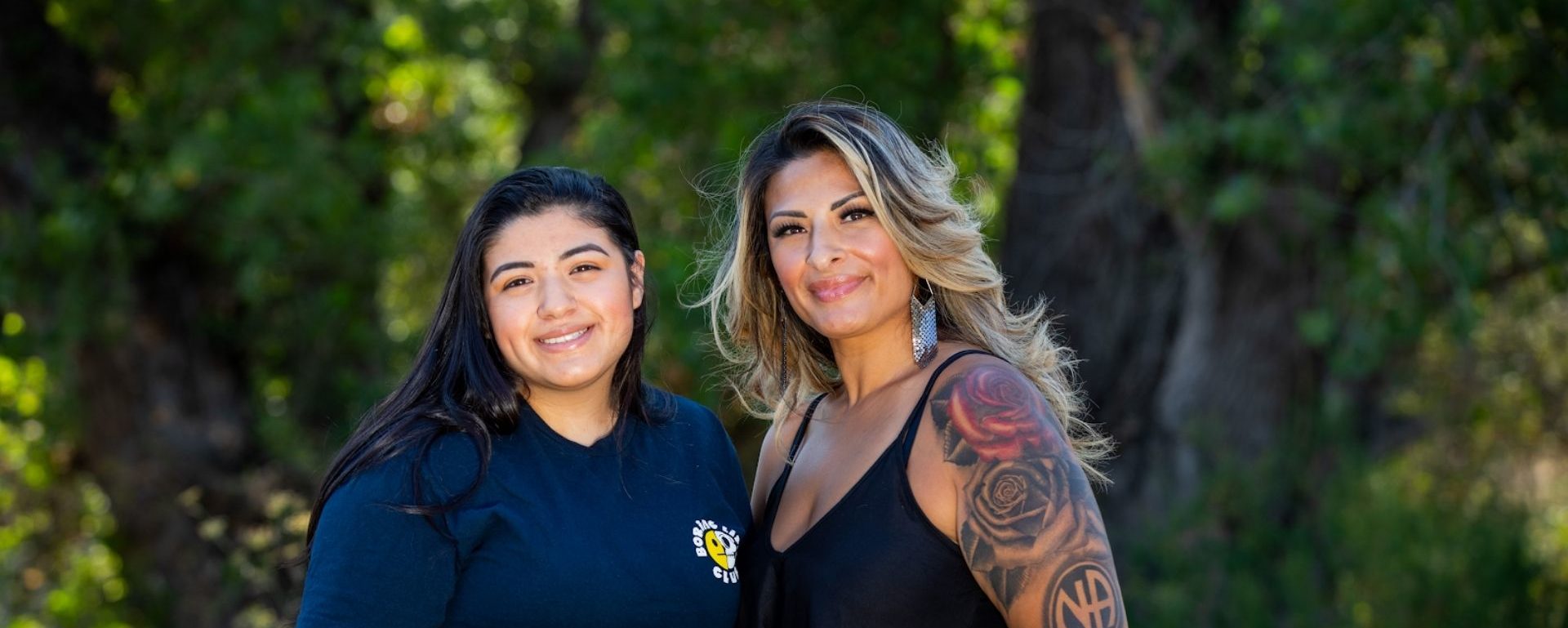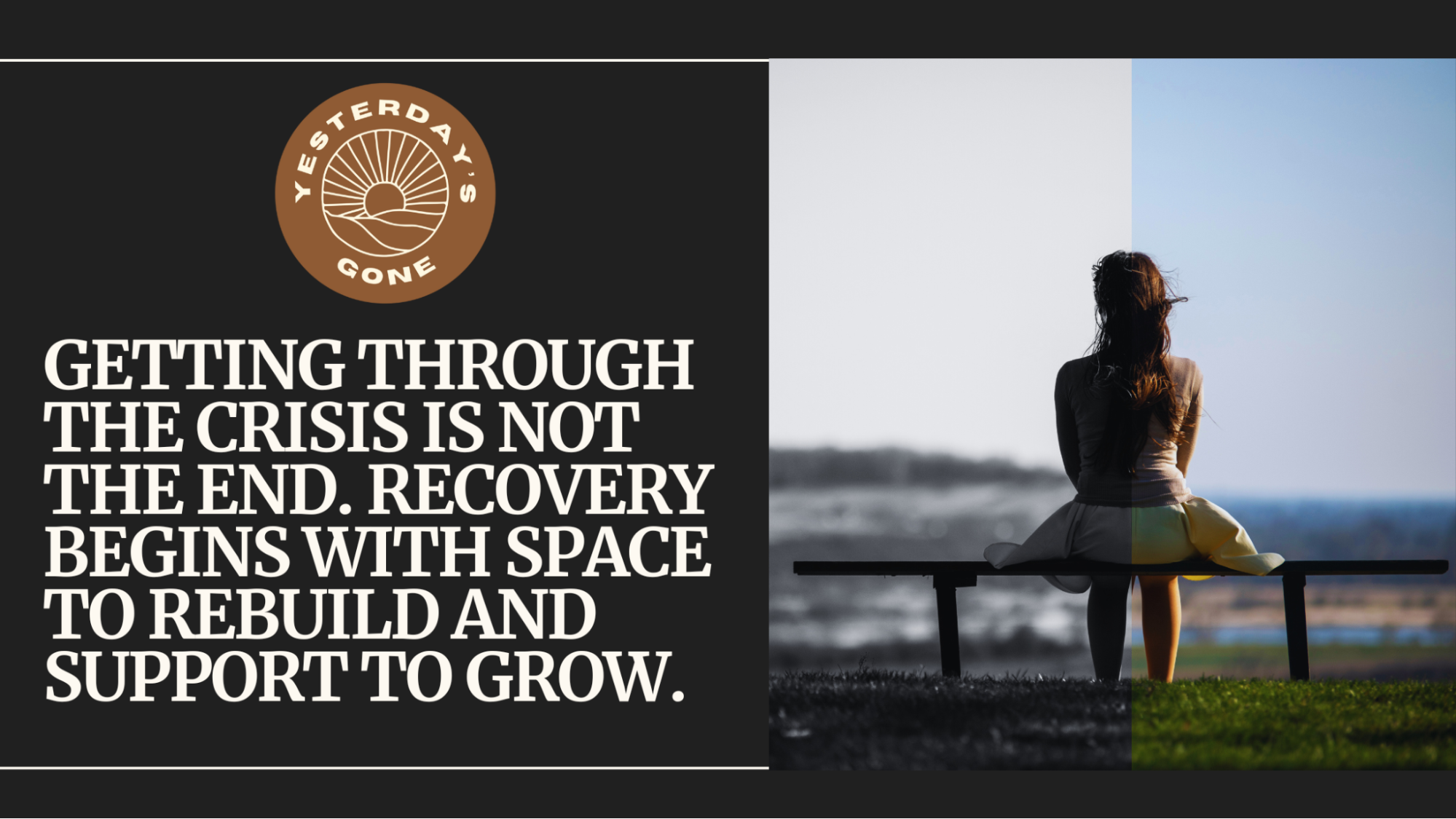

There is a difference between making it through the day and truly reclaiming your life.
At Yesterday’s Gone, we’ve seen it firsthand. The women who come through our doors have survived some of life’s most painful chapters. Domestic violence. Generational poverty. Emotional, physical, and psychological trauma. Abandonment by family or partners. The raw courage it takes just to endure—to survive—is nothing short of heroic.
But survival is not the end of the story. It is only the beginning.
Understanding the difference between surviving and healing is the first step toward change. Because while survival is a testament to her strength, it often comes at a devastating cost.
Surviving is not stability; it is endurance.
For many women we serve, surviving looks like sleeping in a car with their kids, staying in unsafe relationships just to keep a roof overhead, or working multiple jobs while silently carrying the weight of trauma. It means constantly being in fight-or-flight mode, with no time to breathe, process, or heal.
Survival keeps her alive, but it does not give her the life she deserves.
Survival is about getting through the day, often by any means necessary. It is fueled by adrenaline, necessity, and instinct, not stability or peace. A woman in survival mode may appear strong, but beneath the surface, she is carrying invisible burdens.
Here is what survival can look like for the women we serve:
This is survival. It is strong. It is fierce. But it is not sustainable. And it is not the life she deserves.
What she needs is time. Time to rest. Time to feel safe. Time to heal.
Survival can only carry her so far. Without a stable environment and long-term support, healing is impossible. That is why Yesterday’s Gone exists to give her more than just a way to survive. We give her space to rebuild her life from the inside out.
Healing is not about “getting over it.” Healing is about becoming whole again on her own terms.
And that’s the difference between surviving and healing—the shift from just making it through the day to finally having space to grow, breathe, and rebuild.
It begins when a woman finally has the safety, support, and time she needs to do more than just react to life. It begins when she no longer has to fight for every breath or compromise her dignity just to survive.
At Yesterday’s Gone, we’ve witnessed remarkable transformations when women are given the right foundation. Healing can look like:
Healing is a long journey. It does not follow a straight path. But every step forward is made possible because she finally has a place to land—and people who refuse to give up on her.
Here is the hard truth: Most systems are not designed for healing. They are designed for crisis management.
When a woman escapes abuse and/or trauma, she may be placed in a temporary shelter or short-term housing. These systems are essential, but they are not enough.
If you want to see how this plays out in our own community, take a look at what’s happening to women in Williamson County—where shelters are full, timelines are short, and trauma goes untreated.
Most public systems are built to handle immediate emergencies, not long-term transformation. A woman escaping abuse might find a temporary shelter, a food pantry, or a hotline number. These are vital, but they are just the beginning. After a few weeks or months, she is expected to figure out what comes next on her own. There is no map. No hand to hold. And no stable ground to stand on.
Healing from trauma does not follow a deadline. It cannot be rushed or squeezed into a 30-day program. Recovery takes time, real time to rebuild trust, process pain, restore identity, and create a future. But the world moves too fast for her healing. Society applauds her for leaving an abusive home but does little to support her in what comes after.
The biggest barrier is often housing. Without long-term, affordable options, she remains in crisis mode sleeping in her car, couch-hopping with kids, or returning to unsafe environments just to have a roof over her head. From there, everything else unravels. There is no way to focus on therapy, employment, or education when she does not know where she will sleep next week.
Even when she wants to grow, the tools are out of reach. There are few flexible programs that allow her to go back to school or learn new skills while also caring for her children. Transportation and childcare become daily obstacles that can derail her entire path. And even if she makes it to a class or interview, the emotional weight of untreated trauma follows her.
Worst of all, most systems do not address the trauma itself. They treat the symptoms, poverty, homelessness, addiction, but rarely the root. Trauma is not just a bad memory. It rewires the brain. It creates shame, hypervigilance, and emotional exhaustion. Without safe spaces to unpack that pain and re-learn trust, she cannot move forward—no matter how hard she tries.
Women are not failing. The timeline is. The resources are. The support systems are. Until we build programs that honor how long real recovery takes, women will keep returning to the very cycles they fought so hard to escape. And that is not because they are weak. It is because the system never gave them a real chance.
At Yesterday’s Gone, we believe that women deserve more than a quick fix. They deserve a real chance to heal, grow, and thrive. That is why we do not just provide emergency shelter, we provide a home, a structured program, and a caring community that supports women every step of the way.
Our year-long, on-site healing program is rooted in long-term transformation. Every woman in our care receives safe, fully furnished housing for herself, her children, and even her pets. We know that healing begins with stability, and stability starts with a home where families can stay together.
Each participant is paired with a life coach and given access to emotional recovery support tailored to her journey. From trauma-informed care to practical life skills, our team walks alongside her, helping her rebuild trust in herself and in others.
We also offer pathways to education, job readiness, and financial independence. Whether she dreams of going back to school, starting her own business, or re-entering the workforce, we help her build a practical roadmap to achieve those goals.
Most importantly, women at Yesterday’s Gone are surrounded by a nurturing community of staff, volunteers, and peers who remind them every day that they are not alone and that they are worth fighting for. Healing does not happen in isolation, and no one should have to do it alone.
At Yesterday’s Gone, we fill the painful gap between crisis and confidence by meeting the difference between surviving and healing head-on.
But we cannot do it without your help.
The truth is, healing does not happen by accident. It happens because someone like you chose to care. Choose to give. Choose to believe that every woman deserves the chance to rebuild her life. Your donation is not just a number. It is the key that unlocks her next chapter.
When you sponsor a woman’s healing journey at Yesterday’s Gone, you make it possible for her to receive the essentials she needs to truly recover. This includes access to mental health counseling, trauma-informed coaching, and transportation assistance to reach the support systems that can change her life. It also means providing a safe and dignified home where she and her children and even her pets can finally breathe, rest, and begin to heal.
Your gift helps open doors to job training, education, and life skills that build lasting independence. And perhaps most importantly, it surrounds her with a community that believes in her potential. For many women, that belief is the beginning of real transformation. Because when someone believes in her, she can begin to believe in herself too.
At Yesterday’s Gone, we honor survival, but we fight for healing because we have seen what happens when a woman is given the tools, time, and support she needs to truly recover.
She starts over. She starts dreaming again. She begins to lead, to give back, and to thrive.
And it all begins because someone, maybe you decided she was worth investing in.
If you believe, like we do, that survival should not be the end of her story, we invite you to take action today.
Your donation helps provide therapy, safe housing, and the tools she needs to rebuild with dignity.
Subscribe to our newsletter for real stories of healing, behind-the-scenes updates, and ways you can make a difference—one woman at a time.
Stay connected. Stay inspired.